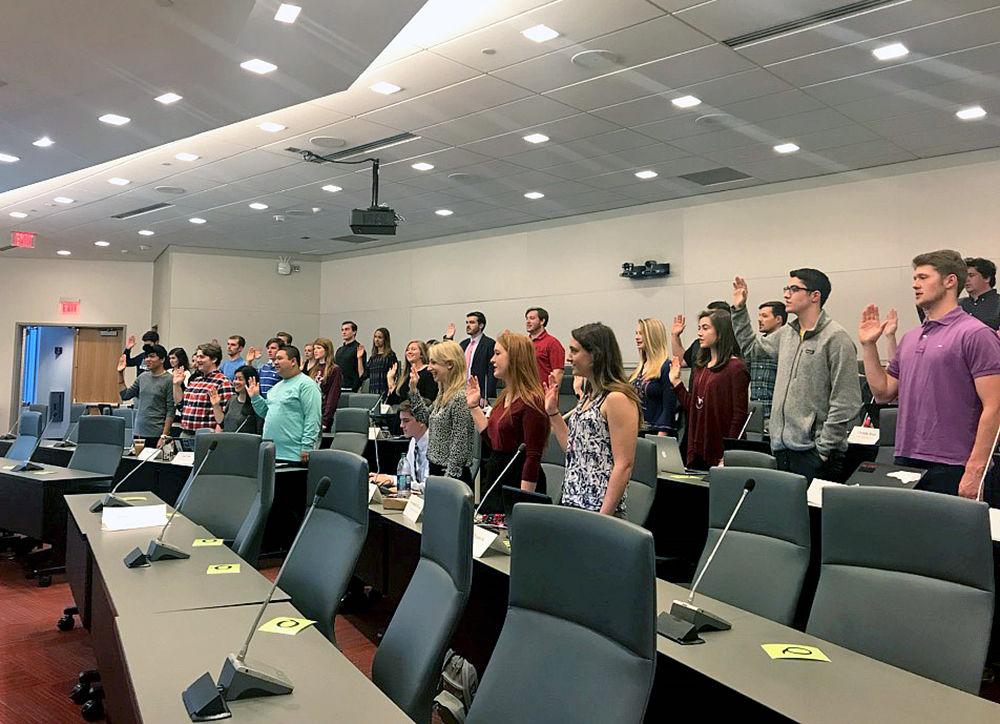During the first Senate meeting of the 98th session of Student Government Wednesday, new senators were oriented into the works of Student Government and Senate officers were elected.
Adam Schmidt, a third-year studying civil engineering and Student Senate president, started the meeting by welcoming new and old senators and discussing his vision for the 98th session.
“As the Senate president, a big part of my job is to fight for you and ensure that you have the resources you need,” Schmidt said. “[That] you have what you need, you have the appropriate support to tackle the issues you want to tackle, that you’re excited, you’re driven and that you have all the things you need to connect you with your passions.”
After student body officers introduced themselves to senators, Jess Errico, a fourth-year studying mechanical and aerospace engineering and student body president, expressed the importance of attending the Association of Student Government meeting at NC State.
“That is a place where, one, you can seek money,” Errico said. “They have a lot of money for funding for events. But two, if your advocacy project is something that is a UNC System-wide issue or UNC System-wide policy you’re looking at that’s another place you’ll be wanting to promote your efforts. They also have bills, a lot of what happens here in Senate is transferable to there and you can write bills and have bills on the floor there that have been endorsed by, theoretically, all of the UNC schools.”
Jessica Murphy, director of Student Involvement*, said that the changes to the advising should make communication throughout all branches of Student Government significantly easier.
“Right now we are in the process of moving into a new advising model,” Murphy said. “From tonight forward there is one SG advisor. We’re in the process of hiring a new full-time advisor that will be the advisor to all branches of Student Government. This is actually a very good thing for SG, it will help you coalesce the branches a little easier, function easier, have good conversation easier, the communication will be easier.”
Zac Lentz, fourth-year Ph.D. student in biological agriculture engineering, was elected as Senate president pro tempore. He said that one of his goals as helping other people navigate success through Senate
“One other goal I do have for this session is to help facilitate some discussions, based on my experience, that tend to come up towards the end of the session, especially around budget time,” Lentz said. “So we can actually have more time to actually discuss them and make informed decisions.”
Coleman Simpson, a third-year studying agricultural science and political science representing the College of Agriculture and Life Sciences, was elected as legislative secretary. Simpson said that he wants to help guide senators who may not know the jargon necessary to write bills.
“I believe legislative secretary is one of the most important roles because it deals with a lot of the internal and procedural workings of how Senate operates,” Simpson said. “Bills take a lot of time and they can be really difficult to write if people don’t know what they are doing. As legislative secretary I would definitely want to be a resource to everyone so that you know what’s the difference between a finance bill, a Senate resolution, a regular resolution, an impeachment bill whatever you’re trying to stir up this year.”
Sophie Holmes, a first-year studying engineering and representing the College of Engineering, was elected as Senate secretary. Holmes said that her experience of taking diligent notes at Senate meetings and her ideas for organization of attendance would help her excel as secretary.
“Part of the reason I want to be Senate secretary is because I really want to make an effort to get to know each and every one of you,” Holmes said. “I think it’s really important that we as a Senate are a community. I’m really eager to get to know all of your names. I’m really organized, I’ve taken dedicated notes at past Senate meetings of the last session.”
Dominic Rodts, a first-year studying mechanical engineering representing the College of Engineering, was elected as sergeant-at-arms. Rodts said that his desire to maintain order and ability to enforce rules would make him an effective sergeant-at-arms
“I really understand what it’s like when you’ve got to explain to people what needs to be done,” Rodts said. “Another big role of sergeant-at-arms is explaining to visitors the processes, what they are expected to do and I feel like I can communicate to people pretty well and in a way that they understand what the expectations are and how they would need to act during meetings.”
First reading of legislation was considered in block. It was then sent to committee of onboarding and leadership development to approve.
In the closing Q&A session, Errico said that the Executive Branch will look toward the Senate for legislation or context of laws they may need to make effective change. Errico also said that Senate can look to the Executive Branch to advocate for initiatives they are passionate about.
“Often times I think you’ll find yourselves being reached out to by directors saying ‘is this something that can be supported by legislation’ and add additional weight to when going to administration,” Errico said.
Editor’s Note: This article was changed to accurately reflect Jessica Murphy’s title.








